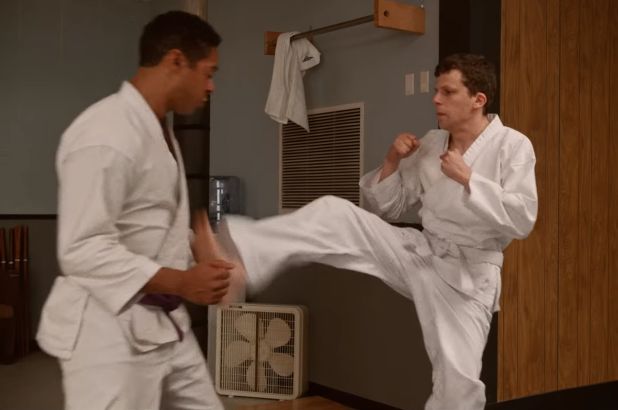Poots, playing a character named Anna, serves as the most explicit totem of the dojo’s hyper-masculinity, a trait whose existence comes with some level of misogyny. For Sensei, that level is high. Despite Anna being the most ferocious and gifted of his acolytes, she is passed over for black belt, the most treasured bit of cloth, and is relegated to teaching the children’s classes. Stearns puts a lot of sickening qualities into Sensei, but his specific blend of ignorant insistence that women are weak despite a blinking contrary data point right in front of him coupled with a self-congratulation for even letting Anna join his dojo at all, has a particular ring of truth. How many times has some sex pest’s defense been based on all the good he’s done for women-focused charities or all the women he’s promoted through his organization? The box that Sensei constructs for his followers is a narrow one, and no matter how much heavy metal Anna listens to or how fluent she becomes in German, she’ll never fit into it. For her part, Anna sticks with someone who clearly doesn’t value her talents out of a masochistic desire to put him in his place, like if she punches someone hard enough, he’ll have to change his mind. However, if there’s anything a cult leader loves, it’s creating arbitrary hierarchies, and gender’s as good as any.
The Art of Self-Defense belongs to Eisenberg in his best role in years. He’s not surprising anyone by playing a withdrawn and timid nebbish, but this is more physical than similar roles and it has a dark humor that Eisenberg is adept with. Like Ed Norton’s narrator character in Fight Club, Casey’s been numbed by his perceived insignificance and breaks out when given the chance to perform some kind of sanctioned violence on his fellows. In the twenty years since Fight Club, that kind of arc has stayed evergreen while also remaining just as blinkered and pathetic as it always was. Eisenberg’s sad eyes, longing for a more meaningful life, frequently make him a sympathetic figure, but here, meaning is defined as being admired or respected by people shown to not be worthy of either.
There’s no one Casey would like to impress more than Sensei, and that kind of exaltation is exactly what Sensei is after. Anything that puts him on a pedestal is where he lives, whether that’s simple admiration or wholesale physical dominance. Stearns doesn’t shy away from the effects of violence in his film. Bones are broken, and fists tenderize that sweet, soft face meat. Where others would be horrified, Sensei is standing off to the side, taking a self-satisfied breath. That could be viewed charitably as a coach watching a student learn, but it’s really Sensei seeing one more entrant into his masculinity pyramid scheme, wherein someone buys something they don’t really need and is then enlisted to create a bigger market for said useless item. Nivola is credible in every step as someone who believes in their own line so strenuously that they don’t need to raise their voice in defense of it; they’ve recruited others to do that for them.
Overseeing all of the events of the dojo is the grandmaster, or a framed picture of him. Per Sensei, the grandmaster taught him everything he knew, except for his signature move: stabbing his finger through an opponent’s skull and killing him instantly. While this move sets up a fantastic twist, the grandmaster’s real purpose is as a sad testament to where this kind of lifestyle gets a person. For all his supposed genius and physical strength, he is now remembered, perhaps solely, by a quiet maniac in his strip mall building that probably smells like feet. Congratulations, grandmaster, you did it. The Art of Self-Defense is a big step-up for Stearns as a satirist and as a dark humorist. This is his second film regarding cults or cultish groups, and he’s got his finger on the pulse of joiners and the manipulative minds that convince them to do so. I don’t know if he’s ever stabbed that finger through someone’s skull before, but at this pace, he’ll soon be worthy of having his picture hung in a place of honor. B+

 RSS Feed
RSS Feed